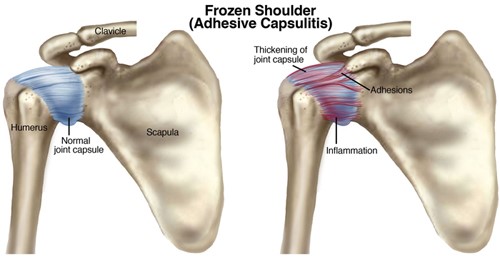What Is It?
Frozen shoulder, also known as adhesive capsulitis, is when your shoulder joint becomes inflamed and stiff over a gradual period of time. It is unclear what causes this to happen but often occurs after a seemingly light trauma.
What causes it?
As stated the exact cause of frozen shoulder is still unknown but most patients tend to recall an injury at the time of the shoulder pain worsening. Initial inflammation into the shoulder joint, known as the glenohumeral joint, causes the shoulder to stiffen producing chronic pain and gradually restricting range of motion. Over time the synovial fluid in the joint lessens creating less room for the joint to move and therefore inability to use the arm.
What does it feel like?
Frozen shoulders are reportedly very painful especially in the initial stage. Pain at night can be severe which is unrelenting and causes tiredness and can affect your daily living. Any movements of the shoulder can cause pain and the shoulder will feel stiff and very heavy.
Due to the pain and stiffness in the shoulder it is common to get pain in the neck and other back pains as you try to compensate for your shoulder.
There are three phases of frozen shoulder. The painful stiffening phenomenon is commonly called the ‘freezing’ stage and can last between 6 weeks and 9 months. This is usually the most painful stage. Next is the ‘frozen’ stage where you may notice no change in symptoms or you may have slightly less pain but no change in range of motion. This stage can last between 4 to 6 months. Finally the thawing stage is when range and pain improve over 5 to 24 months.
How is it diagnosed?
Your physiotherapist can diagnose your shoulder injury from your symptoms, mechanism of injury and also with some simple tests. With frozen shoulder further investigations like x-ray and ultrasound can be important to eliminate any other pathology or damage. Often it is the radiographer who will give you a definite diagnosis once they have cleared anything else.
How can Back in Action Physiotherapy help?
At Back in Action we will talk to you and listen to how your pain is affecting your everyday activities. We will refer you to a radiologist if we need to eliminate any other possible causes. We can help regain movement and manage pain in your neck, back and shoulder with mobilisations, massage, acupuncture and stretching. A progressive stretching followed by strengthening programme is vital for regaining full function in your shoulder so we will create personalised programmes for you including scapula retraining and shoulder strengthening. Painkillers and Anti-inflammatories can help to relieve pain in the initial phase and we recommend you see your local Pharmacist or Doctor regarding the best type for you. We can discuss options with you including conservative rehabilitation and/or surgery.

